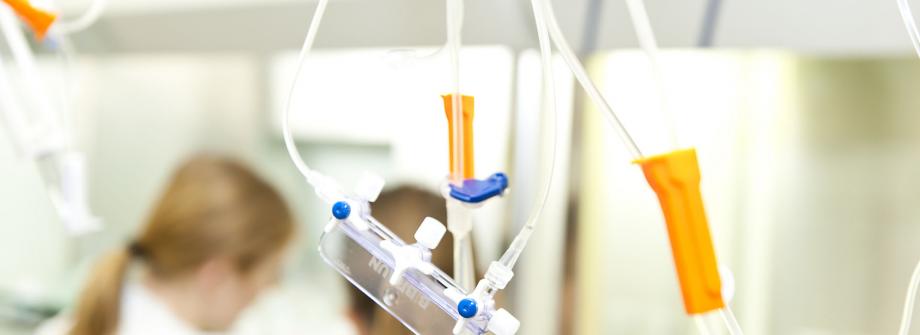
The EBMT launches a new initiative that is to feature a new clinical case every month, to be called "Clinical case of the month". In our Newsletter, the EBMT President and Syed Ali Abutalib will submit cases - clinical conundrum - they have found to be challenging and of interest to our community. These cases will be commented by a series of experts.
September 2019 Clinical Case of the Month
Title: BK Virus after allograft
Submitted by: Syed Ali Abutalib and Nicolaus Kröger
Expert perspective: Per Ljungman
55-year-old woman with history of relapsed/refractory Hodgkin lymphoma presents for routine clinic visit. She is 75 days post HLA-haploidentical transplant. Post-transplant cyclophosphamide (d+3 and d+4) was administered per John Hopkins protocol. She completed 35 day course of mycophenolate mofetil and continues to be on tacrolimus without evidence of graft-versus-host disease. Other medications include bactrim, acyclovir, letermovir and magnesium oxide. She remains in complete remission (CR2) with 100% donor chimera. Review of systems and physical exam are completely unremarkable. Complete blood cell count shows a hemoglobin level of 10.5 g/dL with a mean corpuscular volume of 84 fL. The white blood cell and platelet counts are within normal limits. The creatinine clearance is 120 mL/min; corrected calcium is 12 mg/dL, with a normal liver function test. Routine surveillance viral plasma serologies (cytomegalovirus, adenovirus and Epstein-Barr virus) are unremarkable except presence of BK viremia (52,992 copies/mL). Urine BK virus levels are abnormally high (>2,500,000,000 copies/mL). Both urinalysis and urine culture are unremarkable.
Question: What is the next best management strategy?
A. Closer monitoring for development of urinary tract symptoms and hematuria
B. Closer monitoring for development of urinary tract symptoms, hematuria and urine BK virus
C. Start continuous bladder irrigation
D. Start continuous bladder irrigation and intravesical cidofovir
E. Start continuous bladder irrigation and intravenous cidofovir
F. Urology consultation and cystoscopy
The correct answer is shown after the expert perspective.
Expert Perspective by Professor Ljungman
This case describes a female patient after HLA-haploidentical transplantation with post-transplant cyclophosphamide. She has no urinary tract symptoms but was monitored for BK-viremia, which turned out to be positive. For some reason that is unexplained, also BK-viruria was analyzed with quantitative polymerase-chain reaction (PCR). BK-virus associated hemorrhagic cystitis (HC) is a condition causing significant suffering for those patients developing severe symptoms and it is difficult to manage since there is no proven effective strategy either to prevent or to treat the condition.
In this question, we have six possible management alternatives, and these are my comments to the different alternatives (not in alphabetical order).
First, I would never analyze BK-virus in urine in a patient without symptoms. Thus, alternative B is incorrect. BK-viruria is very common in patients with and without symptoms and even high viral loads can be found also after autologous hematopoietic cell transplantation; a group of patients rarely developing HC. Furthermore, the frequency of detectable BK-virus also in high amounts is very common and therefore can’t be used to predict development of HC since the positive predictive value is low 1-3. The predictive values of BK-viremia have also been studied and although the positive predictive value is better than for BK-viruria, it was only 46% in a prospective study of children undergoing allogeneic hematopoietic cell transplantation 1. Furthermore, there is no study suggesting that an intervention in patients with BK-viremia would have an impact on the risk for development of HC.
There is no data to support prophylactic therapy of any kind in patients without urinary tract symptoms and therefore alternatives C to E are also incorrect options4. Cidofovir has significant side effects given intravenously and the risk – benefit calculation is negative in my opinion. Bladder irrigation mostly requires hospitalization and there is no data showing that this intervention will reduce the risk for later development of HC. Intravesical cidofovir has been reported in a few case reports for treatment of severe and life-threatening HC5. There is no information about this mode of administration having a prophylactic effect4.
The patient has no hematuria and no symptoms and therefore no indication for a cystoscopy. Thus, alternative option F is also incorrect.
This leaves alternative A as the appropriate management strategy in this patient.
Correct Answer – A
References
1. Cesaro S, Tridello G, Pillon M, et al. A Prospective Study on the Predictive Value of Plasma BK Virus-DNA Load for Hemorrhagic Cystitis in Pediatric Patients After Stem Cell Transplantation. J Pediatric Infect Dis Soc 2015; 4(2): 134-42.
2. Erard V, Storer B, Corey L, et al. BK virus infection in hematopoietic stem cell transplant recipients: frequency, risk factors, and association with postengraftment hemorrhagic cystitis. Clin Infect Dis 2004; 39(12): 1861-5.
3. Bogdanovic G, Priftakis P, Giraud G, et al. Association between a high BK virus load in urine samples of patients with graft-versus-host disease and development of hemorrhagic cystitis after hematopoietic stem cell transplantation. Journal of clinical microbiology 2004; 42(11): 5394-6.
4. Cesaro S, Dalianis T, Hanssen Rinaldo C, et al. ECIL guidelines for the prevention, diagnosis and treatment of BK polyomavirus-associated haemorrhagic cystitis in haematopoietic stem cell transplant recipients. The Journal of antimicrobial chemotherapy 2018; 73(1): 12-21.
5. Rao KV, Buie LW, Shea T, et al. Intravesicular cidofovir for the management of BK virus-associated cystitis. Biol Blood Marrow Transplant 2009; 15(3): 391-2.
Contacts
Syed Ali Abutalib, MD
Associate Director, Hematology and Cellular Therapy Program
Director, Clinical Apheresis Program
Cancer Treatment Centers of America, Zion, Illinois
Associate Professor, Rosalind Franklin University of Medicine and Science
Email: abutalib110@gmail.com
Nicolaus Kröger, MD
Professor and Medical Director of the Department of Stem Cell
Transplantation at the University Hospital Hamburg-Eppendorf, Germany
University Hospital Hamburg, Hamburg, Germany
Correspondence: Nicolaus Kröger, MD
Email: nkroeger@uke.uni-hamburg.de
Expert Perspective
Per Ljungman, MD, PhD
Professor of Hematology
Karolinska University Hospital and Karolinska Institute
Stockholm, Sweden
Future Clinical Case of the Month
If you have a suggestion for future clinical case to feature, please contact Nicolaus Kröger.